Is Milk Good For Kids?
This is a post about Milk. The beverage you see advertisements for often, that your mother probably told you to drink up, that is supposed to be good for your bones, health, and just about everything.
But is it?
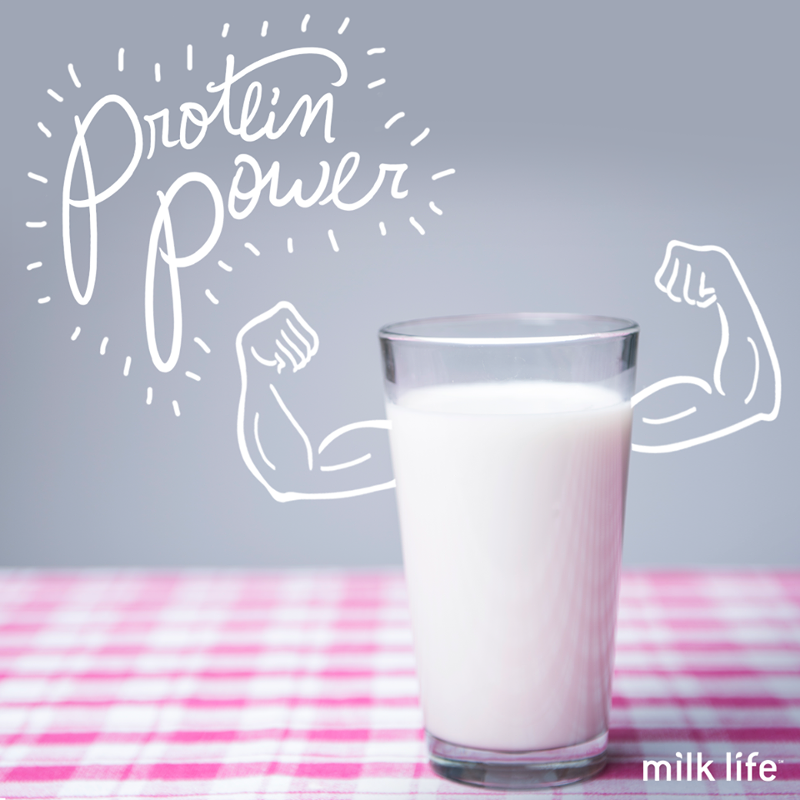
Wow thanks milk industry, thanks for telling me milk has protein and is STRONG.
But I'm not buying into your lies, I know the truth!
They say milk is good for you because...CALCIUM! Every child needs Calcium, right? Where else do you get it from other than milk?
Lets prove your doctor, and your mother, wrong----with science!
To spare you the mumbo jumbo and clutter of data which you can find above (or below), I'll give you what matters: The finding!
Conclusions:
High milk intake was associated with higher mortality in one cohort of women and in another cohort of men, and with higher fracture incidence in women. Given the observational study designs with the inherent possibility of residual confounding and reverse causation phenomena, a cautious interpretation of the results is recommended.
Huh? What do you mean cautious interpretations?
That's a scientisty way of saying "don't adjust your life in case we're wrong, but that's what the data shows!"
So lets have another study!
CONCLUSIONS AND RELEVANCE:
After controlling for known risk factors and current milk consumption, each additional glass of milk per day during teenage years was associated with a significant 9% higher risk of hip fracture in men (RR = 1.09; 95% CI, 1.01-1.17).
Greater milk consumption during teenage years was not associated with a lower risk of hip fracture in older adults. The positive association observed in men was partially mediated through attained height.
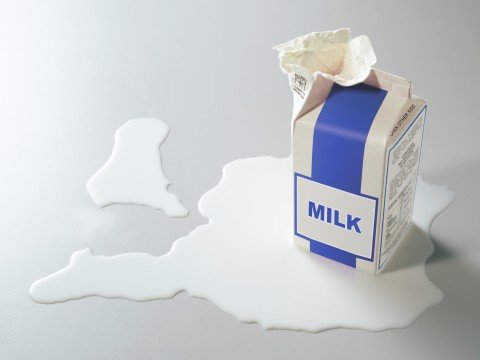
So okay, it clearly doesn't help prevent osteoporoses and simply taking it away from your kids diet likely improves their chance of not breaking their bones up, that's GREAT!
So why did your mother tell you it was good? Doctors and propaganda. Why did the doctors tell you it was good? Propaganda and Dairy Industry funding, plus their mother.
But lets keep it on the people who matter, the kids, not those greedy universities and corporates.
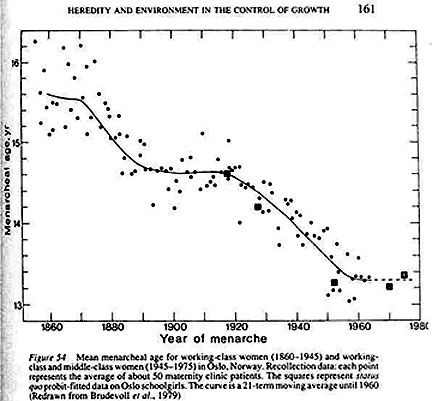
Huh, a chart.
This is where my next point lies,, puberty.
You may be going "huh" right about now, but here's the thing: The average age of puberty is dropping, and has been more and more as the years go by. Since that study was completed in 1960 it has dropped many years more.
So what's the issue?
Well, I'm sure you'd like your little balls of joy to stay little balls of joy for as long as possible, and well, to put it bluntly Puberty changes people, and I would say that change is mostly negative. I certainly would prefer them to stay kids for as long as possible.
But again, lets focus on who matters here, the kids, not us.
In summary, this large-scale systematic assessment robustly confirms the associations between early puberty timing and T2D/cardiovascular disease in women and demonstrates concordant associations with early puberty timing in men. Furthermore, the findings implicate links between puberty timing across a broad range of disease associations in men and women, many reported for the first time.
So what does this mean?
It means that not only is milk not good for your child's bones, but it most likely will end their childhood sooner and cause more diseases and death in later life, as well as quicken their aging process.
What else?
I don't want to beat the bush and drag this on longer than it has to, so I'll break down the other big myth about diary, which all dairy is bad for children and adults, not just milk.
PROTEIN!
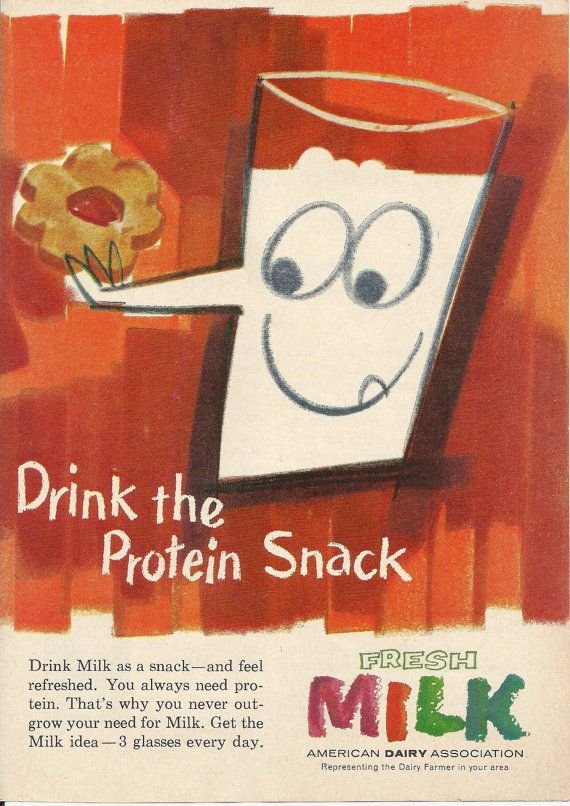
Human beings need very little protein, so this is a biggest joke of them all, as well as the general obsession with protein.
A fully grown adult male or female doesn't need more than 30g/day and 50grams to ensure absorption of enough is recommended.
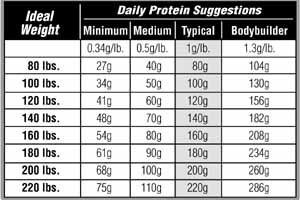
This is one of the WHO's (World Health Organizations) charts/guidelines scaled to average teenager-adult weights. These are adjusted to absorbtion, meaning these amounts assume some is not absorbed.
To ensure perfectly adequate protein "medium" and not "minimum" is recommended, as typically people eat excess protein and therefore typical is unadvised.
So go tomorrow count your child's meals, rough estimates, and see if your child, who's probably lower than those weights, is getting enough, once scaled to their weight.
Or, don't, because there's a population that doesn't have any dairy, ever, and is found to have their diet, the Vegan diet, adequate in all stages of life.
To toss some more evidence at you, here is a source for the percentage of each nutrient healthy human breast milk has.
Mature human milk contains 3%--5% fat, 0.8%--0.9% protein, 6.9%--7.2% carbohydrate calculated as lactose, and 0.2% mineral constituents expressed as ash. Its energy content is 60--75 kcal/100 ml.
To translate this into calories, this would be about 7% protein, 30% fat, 53% carbohydrates.
This is for your baby.
Your infant, your toddler.
When they're growing the most, the quickest, and needing to develop overall everything that will be theirs for the rest of their lives.
They have 7% protein.
White potatoes are 7.6% protein.
Whole wheat noodles are 15.4%
Skim milk is 43%, raw milk and whole milk is 23% or so.
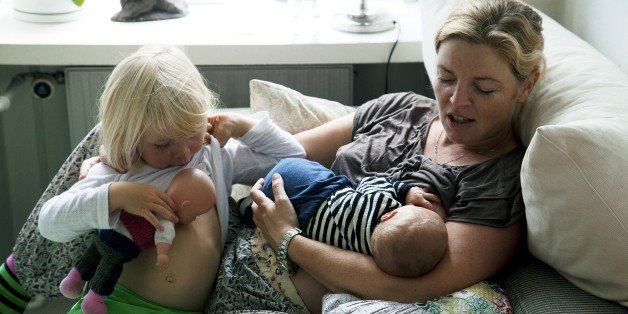
I hope I've made my case to you and you decide that there's no need for milk, cheese, butter, cream, or any sort of dairy derivative in your child's diet.
If you don't want to go and dive into the vegan cult, that's fine. When your child is at a party, you don't need to bring your own cupcakes for your child, they aren't going to die from a little dairy.
But if it's at your home, or you have the option when you're out, say no to dairy.
The only milk your child should be having is YOUR milk. Children naturally lose their lactose tolerance after the first few years of life for a reason; this has only recently changed in people who've had many generations guzzling the bovine juice, and there's a reason we used to be that way.
Disclaimer: While I may be a vegan, and value all life equally, that's different for kids. For whatever reason I place them far above any animal, or other people, and while it may be unethical I'd do horrible crimes in their name if I had to. What I mean is in no way am I trying to save the animals in this article; continue feeding your child honey, while I may disagree honey is not harmful to their health. But dairy is.
If you're unfamiliar with how to make the switch, of alternatives, or think your child can complain I'd be more than happy to give you tips on that too, and I'll likely be making another post on this soon.
As always, this post was spontaneously generated over the course of a number of hours of my freetime on a random day, and I haven't made a lick of editing to it, as I believe genuine words are more powerful than well thought manipulative ones. If even one of you parents make the switch, or are pushed a little further to doing so, my time was more than well spent. Thank you.
Also, as always but something I have never mentioned, all my content is free to be shared or mentioned anywhere for non-commercial purposes. Everything is dear to me and something I simply want to spread the message of, any further benefit is simply a plus.
All source scan be found (science wise) in the blue-linked in their related category/topic.
Picture sources are as follows:
#1
#2
#3
#4
#5 was off a pdf the WHO distributed some years ago
#6
PS - All of this applies to you natural milk lovers too, raw milk is still milk and it still has these nutritional profiles and hormones. The same applies to you goat milk people. It's better than bovine (cow), but it's still really really bad especially due to the puberty issue.
Furthermore, anything read in this article applies to adults too, although the topic was more oriented at kids these basics (such as the estrogen in cow milk) doesn't go away and still affects adults, including men, and due to the estrogen being animal-based it affects us men, unlike phyto-estrogen which (largely) cannot due to being plant-derived and incompatible with our receptors.
Not so sure you're right about phyto-estrogens not having an effect. There is a lot of evidence about the adverse effects of soy.
If you want I can provide sources/pubmeds, but essentially those claims typically came from "health doctors" and not scientists, which usually did not have data to support it.
More recently there has been studies to support that I believe, however I've yet to come across one that didn't have the leading "scientist" or funder being a dairy association, so go figure I guess.
From what I've studied phyto-estrogens cannot link up completely and thus do not have the same effect as mammal estrogens, which can link up with our "parts."
I remember actually having soy as a boy really is irrelevant unless you have about 2gallons a day, then a small impact appears to begin, although they concluded it wasn't statistically significant.
However, little girls (and women too, but less-so) benefit from soy consumption as the estrogens while they don't latch-on they, uhm, do the shimmy in front of your "parts" thus blocking animal estrogens from entering the cells, thus protecting from puberty and more-so breast cancer, as well as overall balancing hormones better.
This is likely one reason Asian women start puberty later, as well as lower dairy consumption and weight, and do not grow as large of breasts till they become pregnant, when they do significantly, uhm, inflate.
Like I said I can dig up some studies for it if you want; that myth originally also because bodybuilders always hit on soy because...well that's a whole 'nother topic.
Essentially whey is a by-product of milk production and the whey industry shilled the fuck out of bodybuilders into believing soy gave them man-boobs even though nobody ever got man-boobs from soy protein on bodybuilding forums...and funnily enough people always got man-boobs from doing a program called "GOMAD" which stands for "Gallon of milk a day."
Heh, I forgot about that.
I don't need a long list of pubmeds, but a Cochrane meta analysis would be a good place to start.
Why do you need a cochrane meta-analysis?
You do realize pubmeds are simply what is put into a meta-analysis? I can provide you a meta-analysis, but they aren't as specific in nature, which is why I didn't here.
They're more general rather than specific.
If I'm wrong and the sources I've cited aren't true, then provide a source for evidence to the contrary.
Give me a cochranet meta-analysis that says otherwise, because I can't find anything relevant in a quick search on their site.
I ask for a Cochrane meta analysis because I trust them and the standards they grade by.
Oh, well I can't find a single thing relating to general nutrition, only specific things like supplementation of (X) nutrient in infants in their search function.
I just wanna point out that if you cn feed your kid unpasteurized, unhomogenized, RAW milk, these effects are negated. Even when the cows aren't grass fed though Grass fed milk is MUCH better due to vitamin K2-mk4.
Otherwise, yeah, the calcium and vitamin D in store milk actually leeches calcium from your bones in order to process it.
I'll admit I ignored all the vegan stuff. I don't ascribe to that ideology. Life is better with Bacon.
What do you mean they're negated?
The argument was on three points, #1 that it is not good for your bones, #2 that it makes puberty earlier due to the hormones in the milk, #3 that it's really not anything great macro-nutrient wise and the protein is not something to be concerned about.
I'd agree it's better, at least if it's your own cow or a friends cow, and that cow only has a small portion of it's milk siphoned/stolen, then it's not as bad, if it's over-exploited though I'd say it could be even worse pasturization kills bacteria, and the life in the milk, which when a cow is over-exploited they become infectious, and thus that's why pasteurization became popular. It's bad, but it's better than drinking milk with active pus/infection in it.
But you can't simply take away the estrogen in milk by making it raw and grass-fed.
It's an animal and it has hormones just like we do, especially after it is pregnant or during the process, and those hormones go into the milk for many reasons, and no amount of bringing them back to nature will take that away.
So why even bother, especially when it's so expensive and hard to find?
As I said, I couldn't care less if you consume honey although I don't, or if the kids do. The bees are fucked and because of how honey stores not buying it, even en-mass, will not really change the amount of bees having their honey taken and replaced with garbage high-fructose gmo corn syrup.
But I promise you your tune will change in a good fifty years when you're an elder. I've seen the devastation it has done to my grandmother and such an existence is truly something nobody deserves. But hey, it's your choice in this society to eat animals that equate to toddlers, and if that's okay with you I hope you are ready for the damage it brings, which we both know it does.
Besides, even disregarding long-term side effects, or ethics, or even the environment, I would probably want to kill myself off how sluggish and fatty it'd be to have bacon since I'm used to clean juicy fruits and melons in the morning.
But hey, if it doesn't make you feel that way, okay, but I'd just say you may only feel okay because you're used to feeling like shit after a meal. Maybe not, but that's how most people I know sadly live their lives. I don't.
Those clean, juicy fruits and melons you've been eating equate to how much sugar exactly?
"I certainly would prefer them to stay kids for as long as possible."
Well, you're certainly getting your wish here (In America). The number of twenty to thirty year olds that act like adults instead of spoiled children is shrinking drastically. I don't think it's the milk consumption that's on the rise.
This study that you linked relies on self reported data. Which is unavoidable with the study design they went with. To top it off their control group was a statistical model. There are numerous problems with using an ideal model as a control.
As for the protein, I would like to point out that vegetable protein sources do supply enough protein gram for gram to live off of. Except that they supply incomplete Protein Chains. I'm not absolutely positive that makes an ultimate difference, but I'm pretty sure it causes your body to handle those proteins differently.
Where do you get your B12 from as a vegan?
I appreciate you taking the time to respond to an unbeliever like myself and hope to have many more differences of opinion in the future.
To not stretch that post out longer, I'll do another.
To address the protein bit, that's untrue and another myth, as the only difference is that plants are not flesh, and thus they do not have the same proportions as it, and thus it won't compare to it.
However, unless you eat just corn or something of the such, you're more than fine.
I can provide a overview of what I eat and how that compares in a day, or what I sometimes feed the kids I babysit if they eat what I eat, and show you how that's so.
Essentially if you want to do it yourself and experiment, go to a site called cronometer.com
It has all the amino acids done out, the essential ones, and all nutrients, simply add in the USDA measurements or similar and it'll have all the nutritional information.
Furthermore, how protein works is you have essentially a pool that circulates around your body of a few hundred grams, which when muscle is broken down it'll re-circulate what it can and reuse it.
Usually you will have 100-300 grams circulating, of all the types of amino acids, mostly the ones you need as it'll mostly be recycled proteins (flesh/muscle), and when you eat more you simply top-off that supply.
Because of this you do not need to even achieve all essential aminos every day, or even every second day, and really won't have a negative impact for weeks till your circulating supply of that amino becomes low, which unless you eat one single food (really a grain) that won't happen.
Beans, potatoes, greens, they're all very well balanced, and honey who eats corn all day (kenya).
B12 was naturally found by us when we drank from dirty creeks and simply lived our daily lives. If you go camping, even if you filter water, you'll get enough b12 from contamination of food or grimy hands.
Because we don't live there most people are b12 deficient. Eating grass fed local buzzword buzzword buzzwords, yes, you'd not have b12 deficiency.
But I don't either, as I can simply rub dirt into my food, or take a pill or injection, which is what I would advise.
Meat only has b12 because of bacteria in the soil they may be eating when munching on grass (ha), you can get that same bacteria isolated without all the bad things of meat for literally less than a cent a day.
As for sugar, it depends, as I eat abnormally high-carb, even for a vegan, I easily get 150g of sugar a day if I eat fruit for breakfast, although I eat a lot, however at the same time I easily get 80-140g of fiber a day, which funnily enough is apparently what scientists found paleo-poop to contain.
Because of that the sugar takes a long time to get into the bloodstream, so there's less spikes, as well as because I don't eat fatty things (essentially anything animal is fatty unless heavily trimmed, oil, etc) typically, blood sugar stays low because nothing is clogging up blood-flow (fat).
My dads a diabetic who doesn't change his meat eating ways and I've used his meter to display the changes, and as long as my fat isn't above about 20% I can literally have 600g of sugar a day and have no blood sugar problems, which is hard to even achieve and isn't the most fun as, well, sometimes you want something warm and potatoes and beans don't have sugar in the strict sense.
I'll take time for anyone if they'll take the time to read it or at least make an argument as even if only 1 in 100 change their mind, that's likely multiple kids who aren't raised with bad foods and every little bit counts.
How can something being fatty be bad if saturated fats are what the body uses to make replacement cells for your skin and your brain? I mean, yeah, your body will turn other things into fat to make those cells but it's been shown that it'll go after fat first as choices of building blocks.
Where do you think the B12 in the dirt comes from? Those bacteria are produced and live in digestive tracts. Ruminants reabsorb that B12 into their meat by re-eating previously digested food, humans don't get that option unless they're eating ruminant meat or their own poop (or the crap of others, though I think that goes against the 'no animal byproducts' part of veganism. Not sure where that line is drawn, or if it's a moral imperative or not.).
If you want me to shorten things in the future I can by the way, but I'd have to be less detailed.
Vegan-wise as long as the animal consents, which means harvesting shit in the forest that was abandoned there, or buying or using another persons is fine, vegan-wise.
Yes, it originally (maybe?) came from poo/digestion, but it thrives in the dirt on it's own now.
Still like I said it's a non-issue.
@thatadvocate, Cheers from a fellow vegan. I can tell you put your heart into this post. Keep up the good work you are definitely gonna make it here.
Upvoted and Followed.
Peace.
Thanks mate; hopefully so :)
But I love milk... Anyways, excellent post! ;)
I loved milk too; then I discovered this out for myself and switched to soy milk, and mostly stopped drinking it entirely as I didn't really like it.
Then my brother got some Almond milk, I tried it, and it was alright. Then I tried choco almond milk and it was amaaazing.
Now I can't miss it at all.
I used to hate baked potatoes, but now I adore them :3